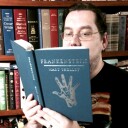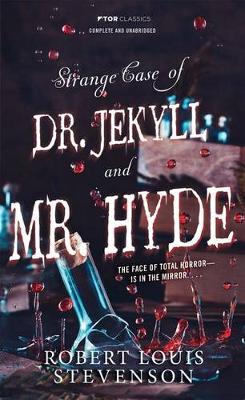
Tor Classics are affordably-priced editions designed to attract the young reader. Original dynamic cover art enthusiastically represents the excitement of each story. Appropriate reader friendly type sizes have been chosen for each title--offering clear, accurate, and readable text. All editions are complete and unabridged, and feature Introductions and Afterwords.
This edition of Strange Case of Dr. Jekyll and Mr. Hyde includes an Introduction and Afterword by Charles L. Grant.
British lawyer Mr. Utterson had proof. Hyde was a foul, twisted, shrunken creature who had brutally stomped a little girl and beaten an old man to death--for no reason. Hyde left a trail of evil across London; the mere sight of him made stranger violent with fear and disgust...
But Hyde was Dr. Jekyll's sole heir.
And that made no sense at all. Henry Jekyll was the kindest, most civil, most respected man in England. What power could a monster like Hyde hold over Jekyll's soul? Utterson vowed to solve the mystery, and free his friend from Hyde's clutches...until his hunt led to a horror beyond blackmail, beyond extortion; to a secret so shocking, so sickening, so personal--That the sheer terror of the truth could drive men mad...
- ISBN10 0812504488
- ISBN13 9780812504484
- Publish Date 15 December 1990 (first published 31 December 1963)
- Publish Status Active
- Publish Country US
- Imprint Tor Books
- Edition Tor ed
- Format Paperback
- Pages 82
- Language English
Reviews


moraa
3.5 stars
Read this so I could finally understand the meaning of the metaphor. Sometimes Google just isn't enough.

maggiefan
Let's begin with the positives:
- a really spooky atmosphere
- Jekyll's kinda cool :)) a very interesting character with a backstory
- Hyde's kinda cool too
- this quote - '“If he be Mr. Hyde,” he had thought, “I shall be Mr. Seek.”'
The negatives:
- I didn't get enough of Jekyll and Hyde. Instead I got more than enough of Mr. Utterson. He's just so bland and boring, I don't know...
- VEEEERYYY slow pacing, especially in the beginning. Nothing happens until the end. And considering it's a very short book it's weird and not okay for me.
- I guessed the plot twist from the beginning. It's not like it's a bad thing. It just took away from the story a little bit. And I think that the author could have tried to make it less obvious.

leahrosereads
But just barely.
I don't recommend this, and honestly, if you want a condensed or different version than the original - watch a movie. You'll get more out of it.
The art is incredible though.

nightingalereads
Well-executed, and an interesting enough premise, but I don't think this one will stay with me. The story's twist has lost all its shock factor in my eyes, and I found the ending to be rather anticlimactic and overly expository.

boghunden
It was a very quick read, but unfortunately the story never really captivated me the way I expected it to. I think that's due to the plot twist (meaning that I knew the story already and therefor I didn't get too excited about the twist with the Jekyll and Hyde-thing. I didn't know about the details though, and I really liked those parts. One of the things I liked in particular, were the letters.
The writing style was pretty good, it didn't feel like an old novel at any point, which I really enjoyed. I also found it to be funny at some parts, like "play Hyde and seek", and the way it described the "evil woman face".
I listened to the audiobook of this and although I enjoyed the narrator, it wasn't really loud enough for me to be able to hear it all clearly when I was out walking. :/

celinenyx
Usually his story is turned into a science-fiction action-packed romp, while the original is much more subtle. It's more mystery than science-fiction. We follow the lawyer Mr Utterson, who is a bit concerned about his friend Dr Jekyll, when Dr Jekyll creates a new will, leaving everything he owns to a the infamous Mr Hyde in case of his disappearance. Mr Utterson doesn't trust this, and suspects his friend is being threatened or black-mailed.
Well, we all already know what's really going on. I think it's a shame I was spoiled with the twist at the end. It takes away much of the mystery if you are in the know. The Strange Case of Dr Jekyll and Mr Hyde is still a very enjoyable novella though. It's well written, and the last chapter alone warrants a reread in a year or so.
I love how books written during the last part of the nineteenth and the start of the twentieth century have themes that you don't find in contemporary literature any more. They still believe in a real good, in technology as solution, but also focus on the soul of man, on our constitution as humans. This descriptive and contemplative nature of writing is pretty much lost after the Second World War, when the belief in mankind is destroyed by the atrocities committed during that time. Literature is much more bleak and post-modern now, which isn't much to my taste.
There is a lot more to The Strange Case of Dr Jekyll and Mr Hyde than the adaptations let on, and I'd certainly recommend it to lovers of soft science-fiction mixed with some interesting non-preachy philosophic bits.

Michael @ Knowledge Lost
This is a reread for me so like I did in The Great Gatsby; I’m going to quote my old review (which is relatively short) but expand with what I know now. First we need some context; Robert Louis Stevenson had already had some success as a Victorian adventure writer before he came up with the idea of Dr Jekyll and Mr Hyde. He had already written Treasure Island and his collection of short stories New Arabian Nights; in fact it is believe that he came up with the idea while working on his revisions for the short story Markheim (which, in my opinion, is his best piece). So already you get a sense that he knows what he is doing and if you’ve read Markheim you can see the similarities clearly. It was the late into the Nineteenth Century where there were extraordinary technological advances being made and people had a growing pessimism towards a possible decline in arts and religion.
The Promethean personality is something we’ve seen in books like Dracula by Bram Stoker, but this novella has more in common with Mary Shelley’s Frankenstein. Both involve scientists that defy the laws of nature and God with major consequences. Also, they play on the concept of good and evil and the dangers of advancing sciences but they also have been written in a way that to this day people debate the meaning of the novel.
Some say this is a novella that looks at that great Victorian idea of inner conflict with humanity; that good and evil exist in us all and it is an internal struggle between the two. While others suggest that maybe Stevenson was interested in exploring mental health, especially when it comes to split personalities or what should be correctly called a dissociative identity disorder? When I first read this book I got a sense of both, saying “[That] it’s a vivid portrayal of a split personality, split in the sense that within the same person there is both an apparently good and an evil personality each being quite distinct from the other.” As an interesting side note Vladimir Nabokov has famously argued that the “good versus evil” view within this novella is misleading, as Dr Jekyll himself is not, by Victorian standards, a morally good person.
“The novella’s impact is such that it has become a part of the language, with the phrase “Jekyll and Hyde” coming to mean a person who is vastly different in moral character from one situation to the next.” While this is true, the tale has left a bigger impact on pop culture than just one phrase and classic horror movies. Within comic books both The Hulk and Batman’s rival Two-Face have clear influences from this novella; in fact you might argue that all superheroes are influenced as well, all living a double life. Even the framework has been used in other fables, gothic, horror and speculative fiction.
“Robert Louis Stevenson is an amazing writer and this book is well worth the read, I’ve always enjoyed a story that tries to explore two sides of a situation.” Not only does this highlight how much I’ve improved in my reviewing but it serves as a reminder of my interest in plots that explore both points of view. Frankenstein still remains my ‘go to book’ for this even though rereading Strange Case of Dr Jekyll and Mr Hyde has rekindled an interest in Robert Louis Stevenson’s thoughts on the whole “good versus evil” view. I much prefer Markheim and think I might go read it again now.
This review originally appeared on my blog; http://literary-exploration.com/2013/05/30/book-of-the-month-the-strange-case-of-dr-jekyll-and-mr-hyde/

adastra

